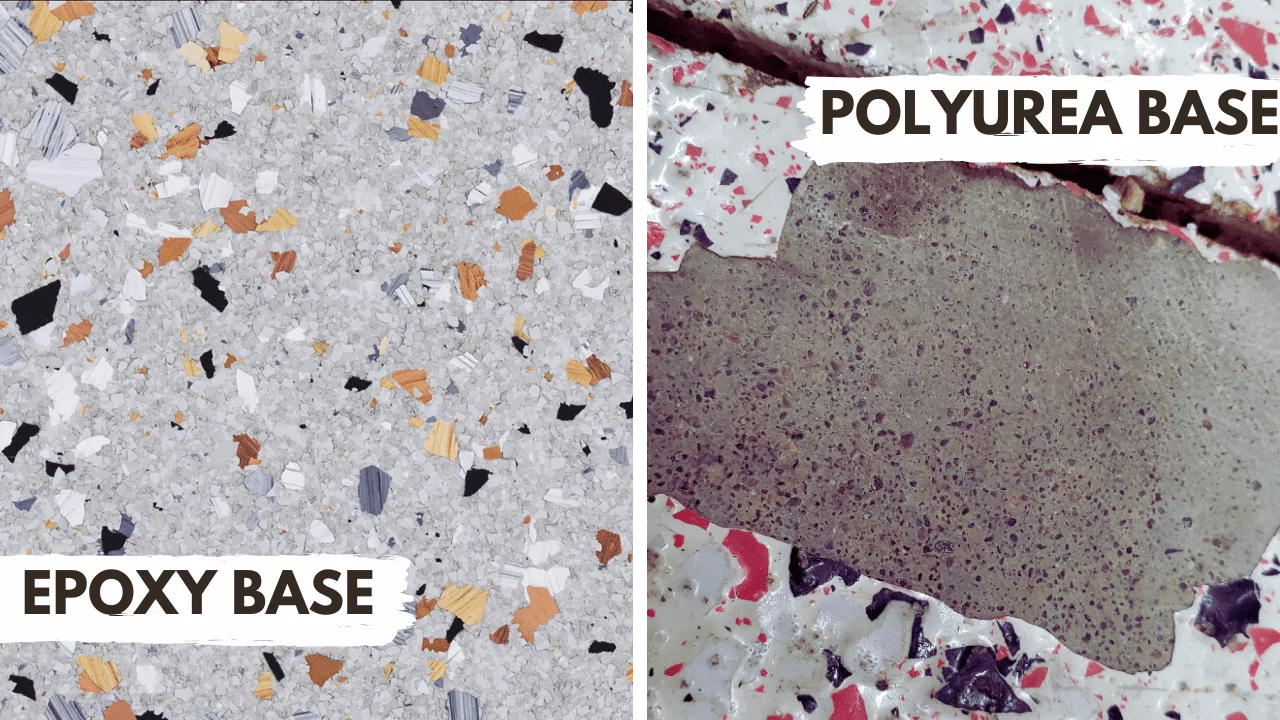Epoxy vs Polyurea: Floor Coating Comparison Guide
The Truth About Durability and Long-Term Performance
When choosing the best floor coating for your garage, patio, or commercial space, you’ve likely come across two popular options: epoxy and polyurea. You might have read claims that polyurea is superior because it cures faster and is more flexible. However, what’s often left out is the long-term durability of these coatings—especially when your priority is ensuring the coating lasts for years without failure.
At Decorative Concrete of Texas, we believe that epoxy is the superior choice for a base coat. Here’s why:
Epoxy's Superior Adhesion: A Stronger Bond for Long-Term Durability
If you want your floor coating to last, it needs to bond to the concrete. That’s where epoxy comes in.
- Fact: Epoxy bonds better to concrete than polyurea. It creates a strong, chemically bonded layer that adheres to the concrete surface better than any other material. This means your coating stays in place—even under heavy use.
On the other hand, polyurea’s quick application can result in incomplete adhesion. That might lead to peeling or flaking over time, especially in high-traffic areas.
Durability That Lasts: Why Epoxy Outperforms Polyurea Over Time
Polyurea may market itself as flexible and quick to install, but when it comes to lasting power, epoxy is the clear winner.
- Fact: Epoxy is more resistant to heavy loads, impacts, and chemicals. It’s the go-to choice for garages, warehouses, and commercial spaces that deal with daily abuse.
Polyurea? Sure, it flexes under pressure. But that same flexibility can be a liability. Over time, it can lose its structural integrity—especially in high-traffic environments.
The Myth of Speed: Why Faster Installation Doesn’t Mean Better Results
Polyurea’s main selling point? It cures fast. Some even claim you can have a new floor installed in just one day.
But faster isn’t always better.
- Fact: Epoxy’s slower curing time allows it to penetrate concrete more deeply, forming a stronger bond. This means your floor will resist cracking and hold up better under stress.
When you’re investing in a floor coating, it’s not about how quickly it’s installed. It’s about how many years of performance you’ll get from it.
Epoxy as the Ideal Base Coat: The Best of Both Worlds
Here’s the bottom line:
Epoxy is the best foundation for a long-lasting floor. It offers unmatched adhesion and durability, ensuring that whatever topcoat you choose—whether it’s polyaspartic, polyurea, or additional epoxy layers—bonds properly and stands the test of time.
- Fact: The best flooring systems use epoxy as the base coat because of its superior bonding properties. Once the epoxy base coat has fully cured, you can add topcoats like polyaspartic or polyurea for UV resistance or flexibility, without sacrificing the durability that epoxy provides.
Designed for Longevity: Why Epoxy Coatings Last Longer on High-Traffic Surfaces
Polyurea might claim to be flexible and less prone to cracking. But here’s the truth: It’s not as hard or dense as epoxy.
- Fact: Epoxy coatings are denser and more abrasion-resistant than polyurea. That’s why epoxy is the preferred choice for high-traffic areas—whether it’s foot traffic, vehicle traffic, or even industrial equipment.
In short, if you want a floor that can withstand years of use, epoxy is the better option.
Why Epoxy is the Right Choice for Your Property
At the end of the day, it’s not about quick installation—it’s about making sure your floors last.
Epoxy offers the best long-term performance as a base coat. Its stronger bond, superior durability, and proven track record make it the smarter choice for anyone looking to invest in their property.
Don’t Be Misled by the Speed Myth
Polyurea’s quick installation might seem appealing, but epoxy’s durability and long-term protection make it the better investment.
At Decorative Concrete of Texas, we prioritize what’s best for your property—durability, strength, and lasting protection. By using epoxy as the base coat, we ensure that your floor coating system will stand the test of time.
Want to learn more? Contact us today to find out how we can help you make the best decision for your floor coating project.
Phone: +1 (214) 471-6134
Schedule an Appointment: Contact Form
Looking for more flooring solutions? Check out our Garage Floor Coatings, Patio Coatings, and Commercial Coatings services to explore how our premium coatings can transform your space.
To learn more about how epoxy, polyurea, and polyaspartic compare in terms of durability, curing time, and UV resistance, check out our in-depth guide here.
Epoxy vs Polyurea Comparison Table: Fact-Based Analysis
Properties
- Durability
- Adhesion to Concrete
- Outdoor Use
- Cure Time
- Color Integrity
- Flexibility
- Cost Effectiveness
Epoxy
- Exceptionally durable, ideal for heavy traffic.
- Superior adhesion, creates a strong bond.
- Best with UV-resistant topcoat outdoors.
- Requires longer curing but ensures durability.
- May yellow without a UV topcoat outdoors.
- Hard surface, excellent for high-traffic areas.
- Cost-effective, long-term investment.
Polyurea
- Flexible but may weaken under heavy loads.
- Faster curing but weaker bond to concrete.
- UV stable, but may fail in extremes.
- Cures in one day, but fast cure risks adhesion.
- 100% UV stable, but durability affects longevity.
- More flexible but may lose strength over time.
- Higher cost for fast cure, less durable long-term.
Benefits
Benefits of Epoxy as a Base-Coat Vs a Polyurea
When your trying to choose between epoxy vs polyurea, it’s important to know the facts. Uncover the top benefits and features of our floor coating process engineered to transform your space with beauty and durability.
- Superior Adhesion
- Durability
- Thorough Curing
- Proven Performance

TAKE THE NEXT STEP
Get a Free Quote
We specialize in concrete floor coatings for a reason. Contact us today for a free, no-hassle consultation.
